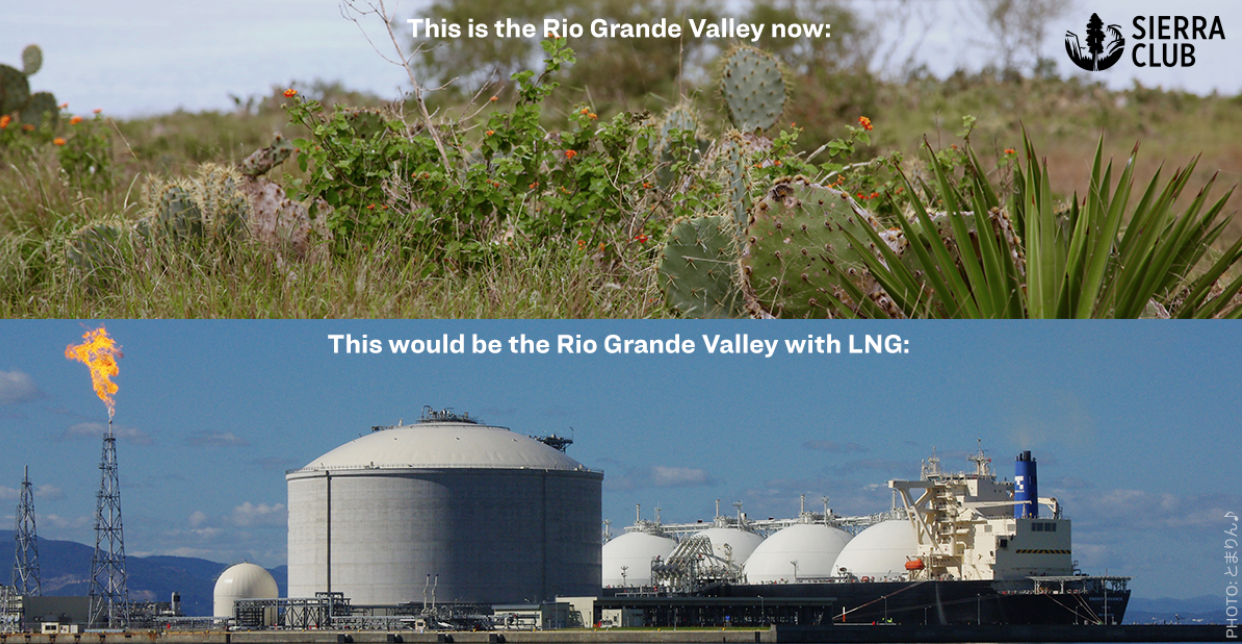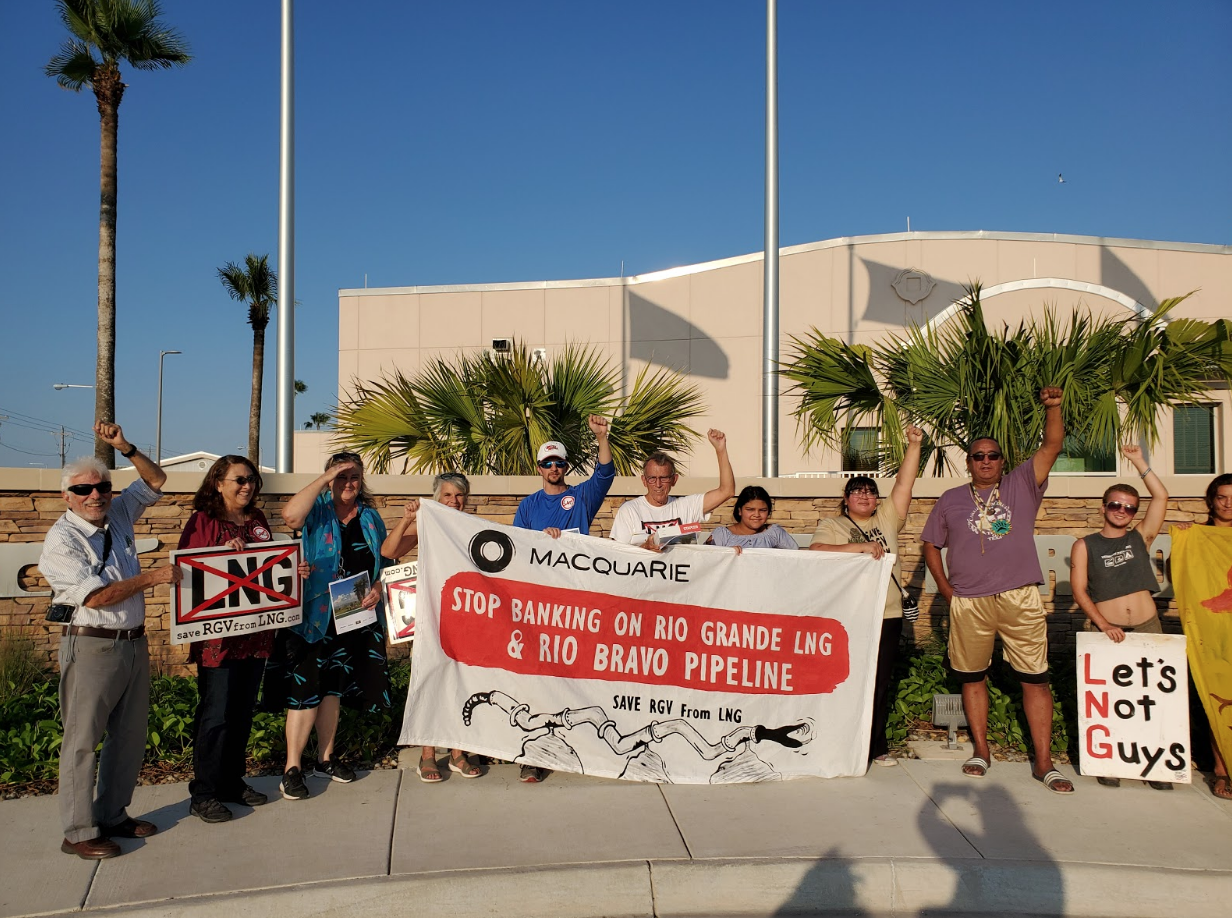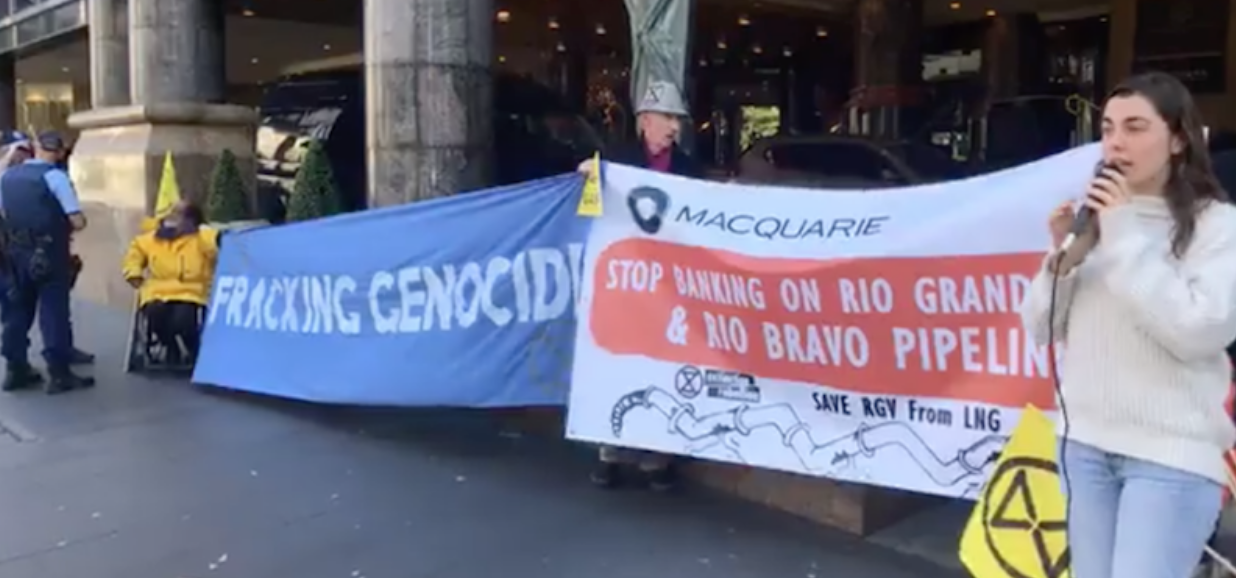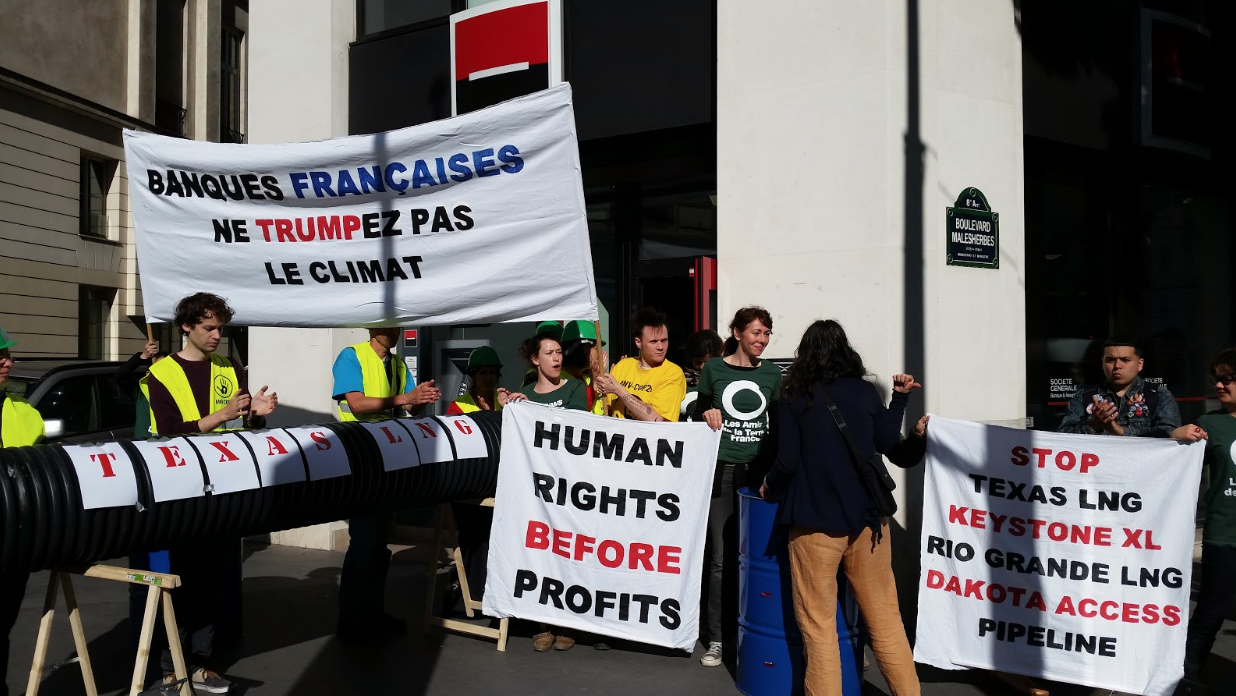In 2014, residents from across the Rio Grande Valley, including those from Port Isabel, Laguna Vista, and Brownsville, heard about five proposed LNG projects that could be constructed at the Port of Brownsville along HWY 48 nearby communities and pristine wetlands. They learned that exporting LNG would have significant negative impacts on their environment and communities’ wellbeing -- and trample over the rights of Indigenous people of South Texas. These concerned residents then formed the Save RGV from LNG Coalition and have gained support from several environmental and local organizations, including the Sierra Club.
Since organizers began fighting these destructive LNG projects, two LNG projects have dropped off, with Annova LNG, Texas LNG, Rio Grande LNG, and the Rio Bravo Pipeline still in the race for permits. Now, thanks to combined efforts, the movement to stop LNG projects in the Rio Grande Valley has reached three continents: North America, Europe, and Australia.

Developments in Brownsville
The Save RGV from LNG Coalition and the Carrizo Comecrudo Tribe, original people of the region, recently collaborated with the Extinction Rebellion NSW Australia to organize a simultaneous, international demonstration against the Rio Grande LNG and Rio Bravo pipeline, and Macquarie, the Australian financial company supporting the projects.. The protest took place on July 24, 2019 at the Port of Brownsville Commissioners meeting and at Macquarie’s shareholder meeting in Sydney, Australia.

July 20, 2019: Protest against Macquarie, a financial company supporting Rio Grande LNG, outside the Port of Brownsville Commissioners meeting.
Texans and Australians made several demands of the Commissioners, Macquarie, and the LNG project developer, NextDecade. For years, opponents of LNG in South Texas have made their concerns well known to state and federal regulators by sending thousands of comments, packing hearings, and meeting with public officials. However, the recent demonstration in Brownsville was different. Valley residents asked Commissioners to demand a supplemental Environmental Impact Statement (EIS) from the Federal Energy Regulatory Commission (FERC) for Rio Grande LNG and the Rio Bravo pipeline. Why? NextDecade told their shareholders that they would plan to export more LNG than they originally told FERC, voiding the validity of the original EIS (more here).
The Port of Brownsville Commissioners are major players in whether LNG gets built. They have leased land to LNG companies and actively support the projects. However, as public officials, they have failed to put the health and wellbeing of their community before profit. The coalition is demanding that the Commissioners listen to the voices of RGV residents, and take public interest and climate science into consideration when making political and economic decisions.
The coalition also presented a new report on the LNG project’s impacts to Valley communities to the Port Commissioners. The report found that the three LNG export terminals would be as damaging to the climate as approximately 61 coal-fired power plants. Residents reiterated their demand that the Port of Brownsville Commissioners and public officials speak on their behalf to FERC, just as the Town of Laguna Vista did earlier in July.
Allies in Sydney Address Macquarie
Meanwhile, in Sydney, Extinction Rebellion asked Macquarie to listen to their concerns, and implored shareholders to hear the words of Juan Mancias, chairman of the Carrizo Comecrudo Tribe. During the shareholder meeting, an ally played a video of Juan Mancias speaking directly to Macquarie. The LNG terminals would invade and destroy the pristine lands of the Tribe, who was not properly consulted by the financiers or developers. The Tribe never gave their consent for their land to be leased and used. Macquarie had no response. You can see Juan’s comments to Macquarie through this link.
Another ally called out the Macquarie CEO and board for the climate impact of Rio Grande LNG and the Rio Bravo pipeline, in light of Macquarie’s brand-new climate statement, which affirms support for the energy transition, a stance which is flatly incompatible with supporting these projects. They would drive expanded fracking in the Permian Basin and Eagle Ford shale, where drilling is already creating an environmental disaster; liquefied fracked gas has a carbon footprint worse than coal. Macquarie chairman Peter Warne tried to defend the company by minimizing its role in the projects, a predictable but unconvincing response: either Macquarie is playing a negligible role in facilitating capital for the projects, which NextDecade surely wouldn’t be happy about; or they’re playing a significant role, and they’re contributing to those climate impacts. You can watch our allies give comments to Macquarie through this link.

July 24, 2019: Demonstrators outside Macquarie’s shareholder meeting in Sydney, Australia.
Solidarity in Europe
In 2017, our Brownsville organizer, Bekah Hinojosa, followed LNG money all the way to Paris, to speak with the French bankers who support LNG projects in the Rio Grande Valley. Juan Mancias, whose video message was played for Macquarie in Australia, accompanied her to speak on behalf of the Carrizo Comecrudo Tribe to French financial advisors and politicians.They spoke with several huge European financial institutions and their shareholders, including Crédit Agricole, BNP Paribas, Natixis, and Société Générale. While there, the team-of-two were able to speak at rallies outside of banks, meet with political advisors to the French president, and even get featured on one of France’s largest radio shows, RTL.

May 2017: Demonstrators showing opposition to Texas LNG, Rio Grande LNG, and Dakota Access Pipeline outside Société Générale’s bank office in Paris, France.
Organizing a protest of Rio Grande LNG’s major financial advisor (and one of France’s largest banks), Société Générale, required a lot of coordination and planning with French non-profit Les Amis de la Terre (Friends of the Earth), who have an active divestment campaign against Société Générale. Les Amis de la Terre, Rainforest Action Network, Carrizo Comecrudo Tribe of Texas, Sierra Club, Save RGV from LNG, and now Extinction Rebellion NSW make up the anti-LNG coalition that continues to push for divestment from LNG projects in South Texas.
Their message to the French banks was no different than what they told Macquarie: LNG would destroy sacred Indigenous sites and pristine lands that belong to the Carrizo Comecrudo Tribe, perpetuate environmental racism by dumping pollution into poor Latinx communities for private profit, and drive runaway climate change.
Société Générale is still an active advisor to Rio Grande LNG and Rio Bravo pipeline, and did not appreciate the Sierra Club’s or Juan Mancias’ testimonies. While Société Générale continues to plug their ears in response to RGV residents voicing their concerns against LNG, the groups’ efforts were not in vain. In October 2017, BNP Paribas announced that they would stop financing certain LNG projects, including the Texas LNG terminal proposed in the Rio Grande Valley. The coalition of environmental groups had condemned BNP’s involvement in Texas LNG in South Texas, which put them out of compliance with ambitions to keep global warming below 2°C by the end of the century.
RGV Will Not Be A Sacrifice Zone
Save RGV from LNG, Extinction Rebellion, and Sierra Club ultimately demand that all parties involved respect the voices of the Rio Grande Valley that have spoken out against LNG -- and for LNG project developers to abandon their invasive and destructive projects all together.
If built, Rio Grande LNG would be the second-largest fracked gas export terminal in North America, releasing more than eight million tons of greenhouse gas pollution per year. The Rio Bravo pipeline, which would transport 4.5 billion cubic feet per day of fracked gas to the terminal, would threaten families along the route with the risk of leaks and explosions.
In addition to NextDecade’s projects, there are already two more proposed LNG installations in the Valley: Annova LNG (by Exelon Corporation) and Texas LNG (by Texas LNG). As these companies, their investors, and advisors prepare to finalize their investment decisions in 2019, it is crucial that local voices are amplified as much as possible - on every continent - against the development of LNG.
Foreign investors that live in nations with stronger pollution regulations are still banking off the environmental exploitation of communities in other countries, such as the Rio Grande Valley. Macquarie might have recently invested in renewables, and France might have banned fracking, but how sustainable and just are they when these institutions still have their hands in foreign fossil fuels? The shareholders and politicians themselves don’t want to live in pollution or with the risk of explosions, leaks, or other potential disasters. Yet the LNG terminals these institutions are supporting would be located directly next to low-income Latinx communities. This does not reflect the values you’d think you’d see in global institutions committed to sustainability.
Every single one of the lower Rio Grande Valley’s coastal communities - South Padre Island, Port Isabel, Laguna Vista, Laguna Heights, and Long Island Village - has taken action to oppose LNG. These communities have either intervened on the company permit applications, passed a resolution opposing LNG, or both. Even local school districts in the area have refused to take financial benefits from Rio Grande LNG and Annova LNG and oppose the construction of these LNG export terminals.
The coalition of these groups and local activists have made it very clear: the Rio Grande Valley is not a sacrifice zone. Companies like NextDecade and their partners should have no authority to force communities and marginalized groups of the Valley, especially low-income Latinx people, to live in their pollution and with the constant risks of explosions or gas leaks.